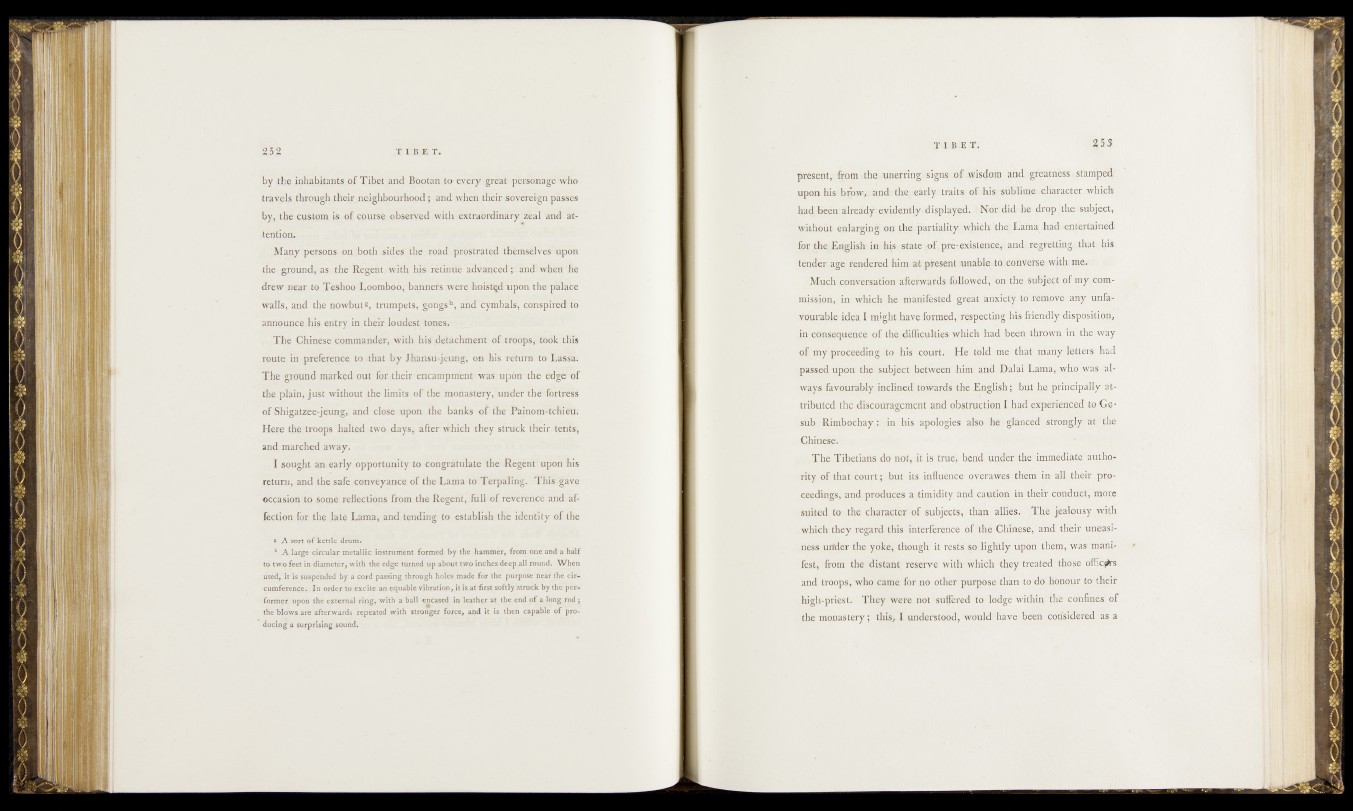
n|qr the inhabitapfe of TibM’flnS Bootan to-every great personage who
travels through their neighbourhood& g ni when their sovereign, passes
by, the custom is pi epursè observed with fextrabi-dindryiSèal and1 è#-
tention. £
Many' persons onjboth sides] thé road prostrated thèrftsélves1 upon
the ground,,as ithfe Regent with his.rètinüe adfaa^cedj-andSwhetfilfe
drew near to Teshoo Loom-boo, banners wère hoist^d npon the palace
walls, and the nowbuts, trumpets, gongsh, and cymbals, conspired to
announce his entry in their loudest tones.
The Chinese commander, with his'detachment of troops, took this
route in preference to-that by Jhansu-jermgi on his return to Lassa.
The ground marked out for-their encampment was upon :thc edge of
the plain, just without thé limits of the monastery,'under the fortress
of Shigatzée-jeung, and close upon the banks of the Painom-tchieu.
Here the troops halted two days, after which they struck their tents,
.and marched away.
I sought an early opportunity to congratulate the Regèrit upon his
return, and the safe conveyance of the Lama to TerpaJing. This, gave
occasion to some reflections from the Regent, full of reverencé and affection
for the late Lama, and tending to establish the identity of the
s A sort of kettle drum.
h A large circular metallic instrument formed by the hammer, from one and a half
to two feet in diameter, with the edge turned up about two inches deep all round. When
used, it is suspended by a cord passing through holes made for the purpose near the circumference.
In order to excite an equable vibration,it is at-first softly struck by the performer
upon the external ring, with a ball encased in leather at the end of a long rod ;
the blows are afterwards repeated with stronger force, and it is then capable of producing
a surprising sound.
TiliB-iE aft’ mm
present,, ,|om cthe,;unedringljsignqinftiW-isdaiib ahdfigteatnessnstampedl
upon tiis. Wowm amLlhepuaily trUit-s* ofjhis^ sublime el'fai icter •whip^
binjffb’een' already! evidently «displayed. IrNuK efidothendnslp Jibeifsnfejeet
wifrbtiuO thefparUaHtyp^ieh?!theg]iuaiiia((hadoeiia|b’t^rTCdi
Jpi ;|h%B0ighsh'; iwil^xsitailte (9f,.pieTex.istmicesiajj<4j,segfebfogothatju-hM) •
tender sage tendered hirm ,all „present iu>nabl|e;itaicfflttVQrs® Av^lihjS worn r ii
'■ Much,,conversation afterwardsi#llo^4d^';oiEirthe/)^^t# oRmjhcbm-
mis^Gn,/in'which* he mahjfestQd,1 g^Mt^anxiety unfavourable
idea I might-have lormcd, respecting'his friendly-dispositions
in consequence of the^dlfhculties which had;hgon1’ thfowit-'in the-wav
of. my proceeding,»tp. iiis court. He toldfhip' that nuny-letters had
passed upon the subject between him and Dalai Lamiashtf ^a’S^l-
wgys- favourably inclined towards the Ruglish; but ^principally attributed
thg discouragement and obstruction 1 had expepmneed tenGe-
sub Rimbochay: -in his apojjogies’-^hoi the1 glanced strongly'at the
Chinese.
The Tibetians do not, it j ^ r ^ bend udUi r the immediate ntitho-
Sily of that court| but its influence overawes them .UfcdWMl^ .ngy8, ;
ceedings, and produces a.timidity and caution inStH&h* condj^, mo^e
.suited to the character of subjects, than allfesn'‘jThe jealousy with
which they regard this interference of the Chinese, and their uneasiness
urtder the yoke, though it rests Sp lightly upon them, was-manifest,
from the distant, reserve with* which they treated'1 those offices
and troops, who came for no other purpose titan to d$ nbpPiir tcf'tneir
high-priest. They were not suffered to fridge witl!fh,‘,lhc cahfines;fbf
the monastery; thisyl Understood, would have .beeri'cbnsidered as] a